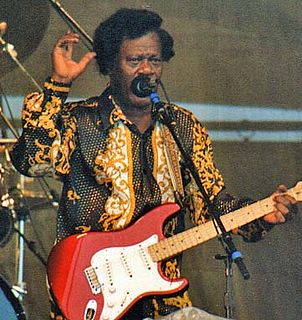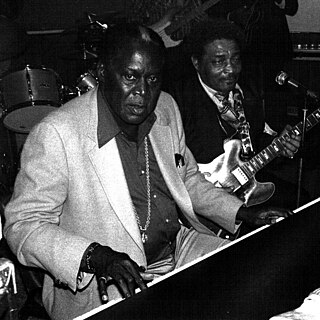This article relies largely or entirely on a single source .(September 2019) |
"The Come Back" is a 1953 song by Memphis Slim. It was one of his signature R&B chart hits. [1]
This article relies largely or entirely on a single source .(September 2019) |
"The Come Back" is a 1953 song by Memphis Slim. It was one of his signature R&B chart hits. [1]

Earl Silas Johnson IV, known as Earl King, was an American singer, guitarist, and songwriter, most active in blues music. A composer of blues standards such as "Come On" and "Big Chief", he was an important figure in New Orleans R&B.

Memphis Slim was an American blues pianist, singer, and composer. He led a series of bands that, reflecting the popular appeal of jump blues, included saxophones, bass, drums, and piano. A song he first cut in 1947, "Every Day I Have the Blues", has become a blues standard, recorded by many other artists. He made over 500 recordings.
United Records was a record company and label founded in Chicago by Leonard Allen and Lew Simpkins in 1951. United issued records by such artists as Tab Smith, Jimmy Forrest, Gene Ammons, Memphis Slim, Roosevelt Sykes, the Four Blazes, the Moroccos, Robert Anderson, and the Staple Singers.
Peacock Records was an American record label, started in 1949 by Don Robey in Houston, Texas, United States.

John Marshall Alexander Jr., known by the stage name Johnny Ace, was an American rhythm-and-blues singer and musician. He had a string of hit singles in the mid-1950s. He died of an accidental self-inflicted gunshot wound at the age of 25.

Ottis Dewey Whitman Jr., professionally known by the stage name Slim Whitman, was an American country music, western music and folk music artist singer-songwriter and instrumentalist known for his yodeling abilities and his smooth, high, three-octave-range falsetto in a style christened as "countrypolitan". He personally stated that he had sold in excess of 120 million records, although the recorded sales figures give 70 million, during a career that spanned over seven decades, and consisted of a prolific output of over 100 albums and around 500 recorded songs, that not only consisted of country music, but also of contemporary gospel, Broadway show tunes, love songs and standards. In the 1950s, Whitman toured with Elvis Presley as the opening act. In the 1990s and 2000s a new generation was exposed to Whitman through his songs featured in the film Mars Attacks!; his famed "Indian Love Call" would kill the invading Martians every time the record was played and his rendition of "I Remember You" was heard in Rob Zombie's House of 1000 Corpses.
"Don't Let the Stars Get in Your Eyes" is a country song about a man away from home who's worried that his paramour may unwittingly stray from their relationship. The song was recorded in many different styles by many artists. It was written by Winston L. Moore and was published in 1952.

"Mother Earth" is a blues song recorded by Memphis Slim in 1951. A slow twelve-bar blues, it is one of Slim's best-known songs and reached number seven in the Billboard R&B chart in 1951.
Albert Luandrew, known as Sunnyland Slim, was an American blues pianist who was born in the Mississippi Delta and moved to Chicago, helping to make that city a center of postwar blues. The Chicago broadcaster and writer Studs Terkel said Sunnyland Slim was "a living piece of our folk history, gallantly and eloquently carrying on in the old tradition."

William M. "Wild Bill" Moore was an American R&B and jazz tenor saxophone player. Moore earned a modest hit on the Hot R&B charts with "We're Gonna Rock, We're Gonna Roll", which also was one of the earliest rock and roll records.

Robert Clifford Brown, known professionally as Washboard Sam, was an American blues musician and singer.
"Pinetop's Boogie Woogie" is a song initially recorded on December 29, 1928 in Chicago, Illinois, United States. It was released on March 1, 1929 by Clarence "Pinetop" Smith on Vocalion Records, a piano rag that cemented boogie-woogie as the name of its entire genre, which eventually evolved into rock and roll. Along with "Crazy About My Baby", "Pinetop's Boogie Woogie" is sometimes cited as "the first rock and roll song", being an early instance of a danceable 12 bar blues with backbeat.

Edward Haughton "Slim" Love was an American professional baseball pitcher from approximately 1910 to 1930. He played six seasons in Major League Baseball for the Washington Senators (1913), New York Yankees (1916–1918), and Detroit Tigers (1919–1920). Over six major league seasons, Love compiled a 28–21 record with a 3.04 earned run average (ERA). He also played in the minor leagues, including stints with the Los Angeles Angels (1914–1915) and Dallas Marines/Steers (1922–1928).
The first season of the Theme Time Radio Hour, hosted by Bob Dylan, ran from May 3, 2006, to April 18, 2007 on XM Satellite Radio for a total of 50 shows.

"Every Day I Have the Blues" is a blues song that has been performed in a variety of styles. An early version of the song is attributed to Pinetop Sparks and his brother Milton. It was first performed in the taverns of St. Louis by the Sparks brothers and was recorded July 28, 1935 by Pinetop with Henry Townsend on guitar. The song is a twelve-bar blues that features Pinetop's piano and falsetto vocal. The opening verse includes the line "Every day, every day I have the blues".

Carvell Lee Ausborn, better known by his stage name, Mississippi Slim, was a hillbilly singer who had a radio show on Tupelo's WELO during the later 1940s and recorded for Tennessee Records. Ausborn also gained fame among Elvis Presley historians because he was one of the earliest musical influences of the young Presley and once let him sing on his radio show.
Slim Rhodes, born Ethmer Cletus Rhodes, was an American country music and rockabilly guitarist and vocalist popular during the 1940s and 50s with his band, Slim Rhodes and His Mountaineers.
"Messin' Around" is a 1948 song by Memphis Slim and His House Rockers, released as Miracle Records 125. It was Slim's first and only R&B chart No.1, spending two weeks at the top of the chart from September 4, 1948.
"Blue and Lonesome" is a 1949 song recorded by Memphis Slim. It was his second major R&B chart hit after "Messin' Around".
The Beale Streeters were a Memphis-based R&B coalition of musicians, which at times included John Alexander, Bobby Bland, Junior Parker, B.B. King, Earl Forest, Willie Nix, and Rosco Gordon. Initially, they weren't a formal band, but they played at the same venues and backed each other during recording sessions.
| This 1950s song-related article is a stub. You can help Wikipedia by expanding it. |